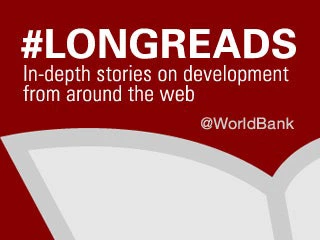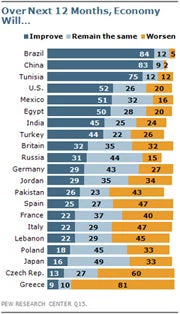Find a good longread on development? Tweet it to @worldbank with the hashtag #longreads.
 With more governments opening their data (see the Guardian’s European governments race to save money through open data), interest is also building in “big data” –a term for the explosion in high frequency digital data. The 50-page “Big Data for Development,” released by the UN Global Pulse July 10 , looks at how real time big data generated through social media and other sources can be harnessed for the public good (also see the webcast and another analysis--Challenges and Opportunities with Big Data—by leading researchers in the U.S.). One would think that the growth in mobile phones in Africa could aid that effort. And Harvard Business Review says that development of the mobile industry at the enterprise level could launch Africa into the global economic big leagues. The growth in online learning is good news for people around the world constrained by skill levels and who lack the resources to upgrade them through conventional training, writes David Bornstein in the New York Times. On the economic front, the global financial crisis continues to affect the public mood in most of 21 countries surveyed by Pew Research Center.
With more governments opening their data (see the Guardian’s European governments race to save money through open data), interest is also building in “big data” –a term for the explosion in high frequency digital data. The 50-page “Big Data for Development,” released by the UN Global Pulse July 10 , looks at how real time big data generated through social media and other sources can be harnessed for the public good (also see the webcast and another analysis--Challenges and Opportunities with Big Data—by leading researchers in the U.S.). One would think that the growth in mobile phones in Africa could aid that effort. And Harvard Business Review says that development of the mobile industry at the enterprise level could launch Africa into the global economic big leagues. The growth in online learning is good news for people around the world constrained by skill levels and who lack the resources to upgrade them through conventional training, writes David Bornstein in the New York Times. On the economic front, the global financial crisis continues to affect the public mood in most of 21 countries surveyed by Pew Research Center.
 (Source: Pew Research Center)
(Source: Pew Research Center)
Big Data for Development: Challenges and Opportunities
Can data from sources like social media, blogs, and mobile phones be useful for development, and enhance resilience to global shocks?
Harvard Business Review: Africa's True Mobile Revolution Has Yet to Start
So far, the buzz about African mobile has been about the consumer side of things, but it is at the enterprise level that mobile could truly become a game changer for Africa.
New York Times: Open Education for a Global Economy
The distribution channels of education have changed — and the future of learning is free and open.
Pew Research Center: Pervasive Gloom About the World Economy
Only in Brazil (72%) and China (70%) do large majorities think their families are better off than they were five years ago, according to a survey of 21 economies.
Longreads is a new, regular feature on the Voices blog highlighting development research and in-depth reporting.




Join the Conversation